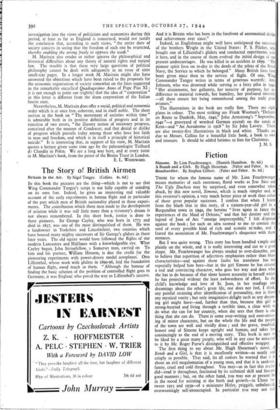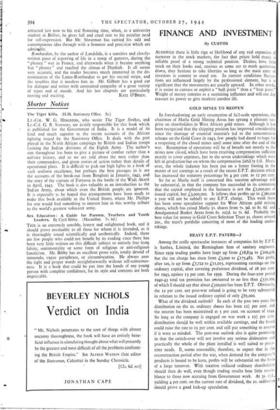Fiction
THOSE for whom the famous name of Mr. Lion Feuchtwanger means memories of such enormous, florid works as 7ew Siiss and The Ugly Duchess may be surprised,, and even somewhat taken aback, by this new novel, Simone which is much simpler and, in this reviewer's opinion, a very much better piece of work than either of those great popular successes. I confess that when I learnt from the blurb that in this story, of a sixteen-year-old girl in a Burgundian town in. 1940, the heroine "lives again in fancy the experiences of the Maid of Orleans," and that her destiny and the legend of Joan of Arc "emerge imperceptibly," I felt disposed against the book ; for such an idea seemed to me to contain the seed of every possible kind of rich and ecstatic mistake, and feared the association of Mr. Feuchtwanger's eloquence with these menaces.
But I was quite wrong. This story has been handled simply and plainly on the whole, and it is really interesting and cut to a good shape. Mr. Fenchtwanger has always tended to over-describe, and to believe that repetition of adjectives emphasises rather than blurs characteristics—and against these faults his translator has not especially helped him here—but in the girl Simone he has created a real and convincing character, who goes her way and does what she has to do because of that sheer honest necessity in herself which he has projected without the least awkwardness of effort. In the child's knowledge and love of St. Joan, in her readings and dreamings about the other's great life, one does not feel, I think, any painful straining after identification of personality, nor is there any mystical vanity ; but only imaginative delight such as any dream- ing girl might have—and, further than that, because this girl is strong-hearted and living through a terrible time, a clear wish to do what she can for her country, when she sees that there is one thing that she can do. There is some .over-writing and over-stress- ing of minor characters' but on the whole the life and the people of the town are well and vividly done ; and the grave, troubled, honest soul of Simone keeps upright and human, and takes her convincingly to the end of a moving story. This book is sure to be liked by a great many people, who will in any case be attracted to it by Mr. Roger Furse's distinguished and effective wrapper. The first thing to say about Mr. Hugh Shcarman's novel, A Bomb and a Girl, is that it is excellently written—as neatly and crisply as possible. That said, let all comers be warned that it is about an evil megalomaniac of a young man, and that it is sardonic, funny, cruel and cold throughout. You may—as in fact this reader did—read it throughout, fascinated by its technical skill and literary good manners ; but, on the other hand, you may not at present be in the mood for assisting at the birth and growth—in Ulster be- tween i915 and 1939—of a miniature Hitler, priggish, unbalanced, overweeningly self-preoccupied. In particular ycti • may not feel
attracted just now to his real flowering time, when, as a university student in Belfast, he gives full and cruel rein to his peculiar need for self-expression. But Mr. Shearman has carried his odd and contemptuous idea through with a firmness and prec:sion which are admirable.
B3mbardier, by the author of Landslide, is a -sensitive and closely- written piece of reporting of life in a troop of gunners, during the " phoney " war in France, and afterwards when it became anything but " phoney ' and reached the climax of Dunkirk. It all seems very accurate, and the reader becomes much interested in the de- termination of the Lance-Bombardier to get his second stripe, and the troubles that it involves him in. Mr. Gilbert has a good ear for dialogue and writes with unstrained sympathy of a great variety of types and of moods. And his last chapters are particularly



























 Previous page
Previous page